Space is one of those subjects (like dinosaurs) that kids love learning and reading about. Some kids read about the mysteries of the cosmos and get so inspired they grow up to be scientists or astronauts. Regardless of whether your kids' ultimate destination is the moon or Earth, they will love these nonfiction space books for kids.
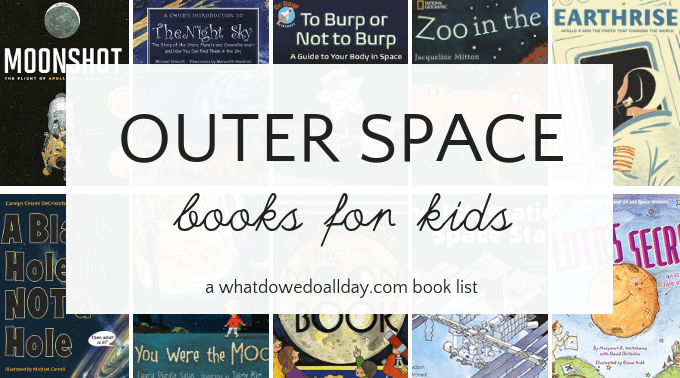
(Note: Book covers and titles are affiliate links. As an Amazon Associate I earn from qualifying purchases.)
Are these space books scientifically accurate? I'm assuming that they are. However, I am neither a scientist nor a fact-checker. If your child wants very specific information about, say, a planet's particular orbit, I propose you use their interest to teach them how to research facts at the library, or on legitimate websites like NASA. In addition, after reading, encourage your children to go outside on a starry night and look up at the sky. Or, plan a trip to the nearest planetarium or natural history museum to get some wonderful hands-on experience!
General Interest Space Books
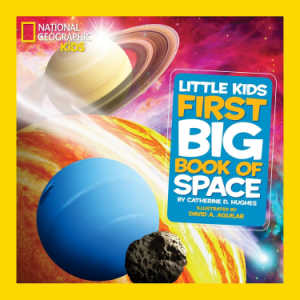
Little Kids First Big Book of Space by Catherine D. Hughes. This is one of the best space books for kids! This oversized, sturdy book is chock full of information. This book is cleverly formatted so it grows with your child. Preschoolers can glean tidbits from the large photographs and main facts, but side notes and information boxes will fill in the details for older children. If you are looking for one book to have at home instead of on repeat check-out from the library, this is my top recommendation.

The Let's Read and Find Out series by various authors. This science book series for kids is an excellent resource to teach children about all aspects of space, from the stars, to planets, the sun and more. What I like best is that the series is leveled so you can easily find age appropriate space books for preschoolers through upper elementary students. And the series doesn't stop at space, be sure to use this valuable resource for all your science interests no matter where in the universe they are located!
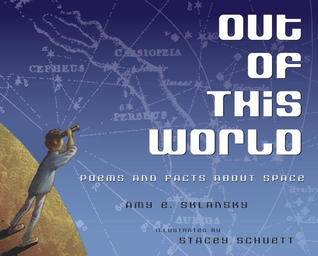
Out of This World: Poems and Facts About Space by Amy E. Sklansky. For a creative take on learning about space, pick up this fun title to share together with your child. Twenty poems about the cosmos mingle with hard facts that will mesmerize anyone with an interest in the stars. Lots of fun, and very appealing!

Earthrise : Apollo 8 and the Photo That Changed the World by James Gladstone. We all know that famous photograph–the first image of Earth from space. To many of us now, seeing our planet from the perspective of being in outer space is commonplace, but it wasn't always! Now your kids can learn about what it must have been like to experience that view for the first time!
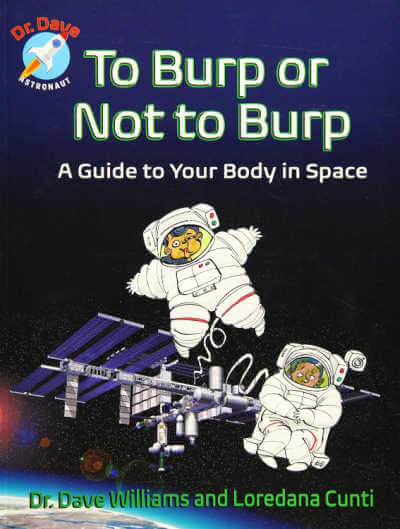
To Burp or Not to Burp: A Guide to Your Body in Space by Dave Williams and Loredana Cunti. It's a legitimate question! Do astronauts burp in space? Kids love knowing about the logistics of being in a gravity-free environment. This book will tell them all the details!
Books about the Stars
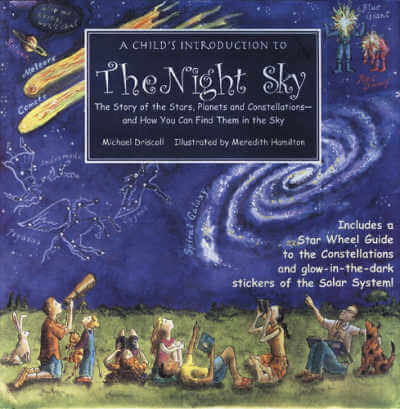
Child's Introduction to the Night Sky: The Story of the Stars, Planets, and Constellations--and How You Can Find Them in the Sky by Michael Driscoll. We've had this book for many years and I still go to it for reference purposes. It is actually not just about the stars and constellations; this astronomy book also contains information about the solar system, but by far my favorite part is the description of the night sky during each season. The book comes with a hands-on star finder and glow in the dark stickers.
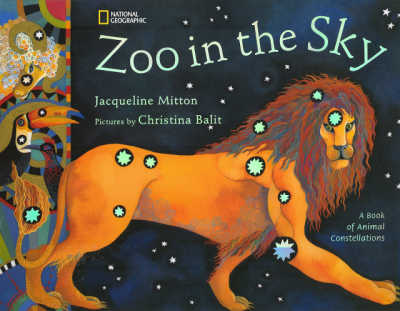
Zoo in the Sky: A Book of Animal Constellations by Jacqueline Mitton. This is a wonderful astronomy picture book to get kids interested in the constellations by harnessing their imaginations and natural inclination for stories. I assert that telling stories about each of the star formations will imprint the information about the night sky on their brains and inspire them to look up every night to see what they can find. Each illustration is accompanied by a mythical story about the creatures and beings after which the constellation is named.
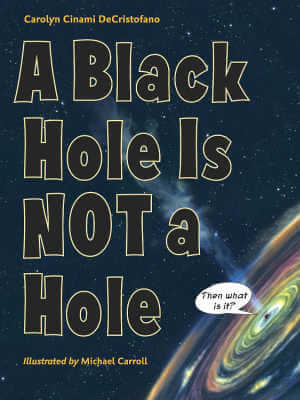
A Black Hole Is Not a Hole by Carolyn Cinami DeCristofano is a book best enjoyed by kids ages 8 and up. And that includes grown-ups! For someone like me, who has little formal science background, I found this book to be incredibly accessible and I got sucked right into it. (Get it?) So interesting!
Children's Books about the Planets

Pluto's Secret: An Icy World's Tale of Discovery by Margaret Weitekamp and David DeVorkin. Who doesn't love Pluto? This fun book will teach your kids about the small planet-not-really-a-planet-actually-maybe-it-is-a-planet. The authors take readers on a tale of how planets are classified and how the methods of classification have changed over time. Of course, it also includes much information about everyone's favorite planet, Pluto.
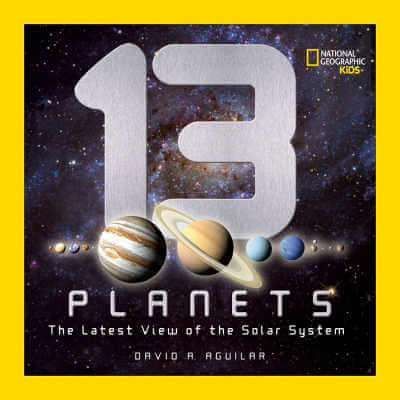
13 Planets: The Latest View of the Solar System by David A. Aguilar. This is just one of many National Geographic space books for kids and I could easily recommend any of them, so don't let your NG reading stop at just the two books I've suggested on this list of space books! 13 Planets is all about–you guessed it, smarty pants–the planets.

The Mighty Mars Rovers: The Incredible Adventures of Spirit and Opportunity (Scientists in the Field Series) by Elizabeth Rusch. I absolutely love the titles in the Scientists in the Field Series. I've never picked up one that didn't suck me in with not only its detail, but its effective storytelling. This picture book is dense with text, so I recommend it for ages 9 and up, but it is fascinating! Note: whatever your child's scientific interest, check to see if there is a Scientists in the Field book to match!
Nonfiction Books about the Moon
I also have a list of children's fiction books about the moon to supplement your reading!

If You Were the Moon by Laura Purdie Salas. You can read this book as a simple poetic picture book about that great orb in the night sky, but it is much more. Lyrical text narrates a conversation between a girl and the moon, and is accompanied by wonderful illustrations and side note facts that illuminate (pun!) the poetry. I highly recommend this a bedtime book.
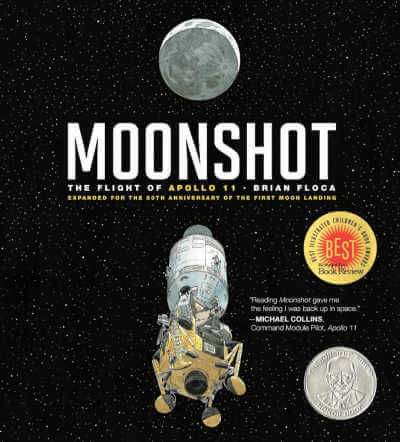
Moonshot: The Flight of Apollo 11 by Brian Floca. A lovely, large book about the historic 1969 adventure to the moon. Floca's illustrations bring the wonder and drama of the flight to children, to whom a space adventure now seems commonplace.

The Moon Book by Gail Gibbons. Gibbons is one of those authors who you can rely on to deliver a full complement of nonfiction books for almost any topic in which they are interested. This is a great introduction to all things moon-related and should be on every space-enthusiast's reading list.
Looking for more out of this world reading?



Leave a Reply